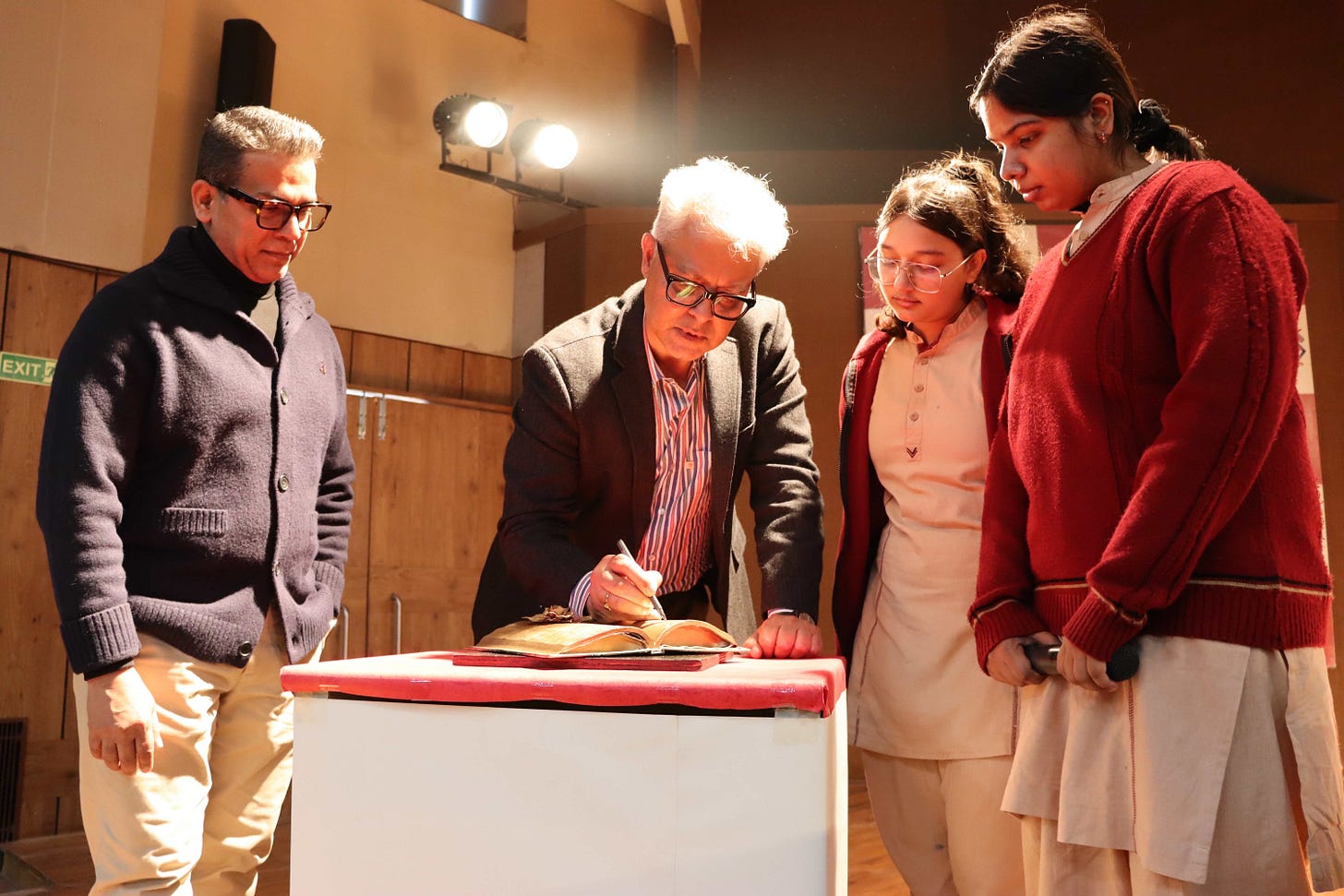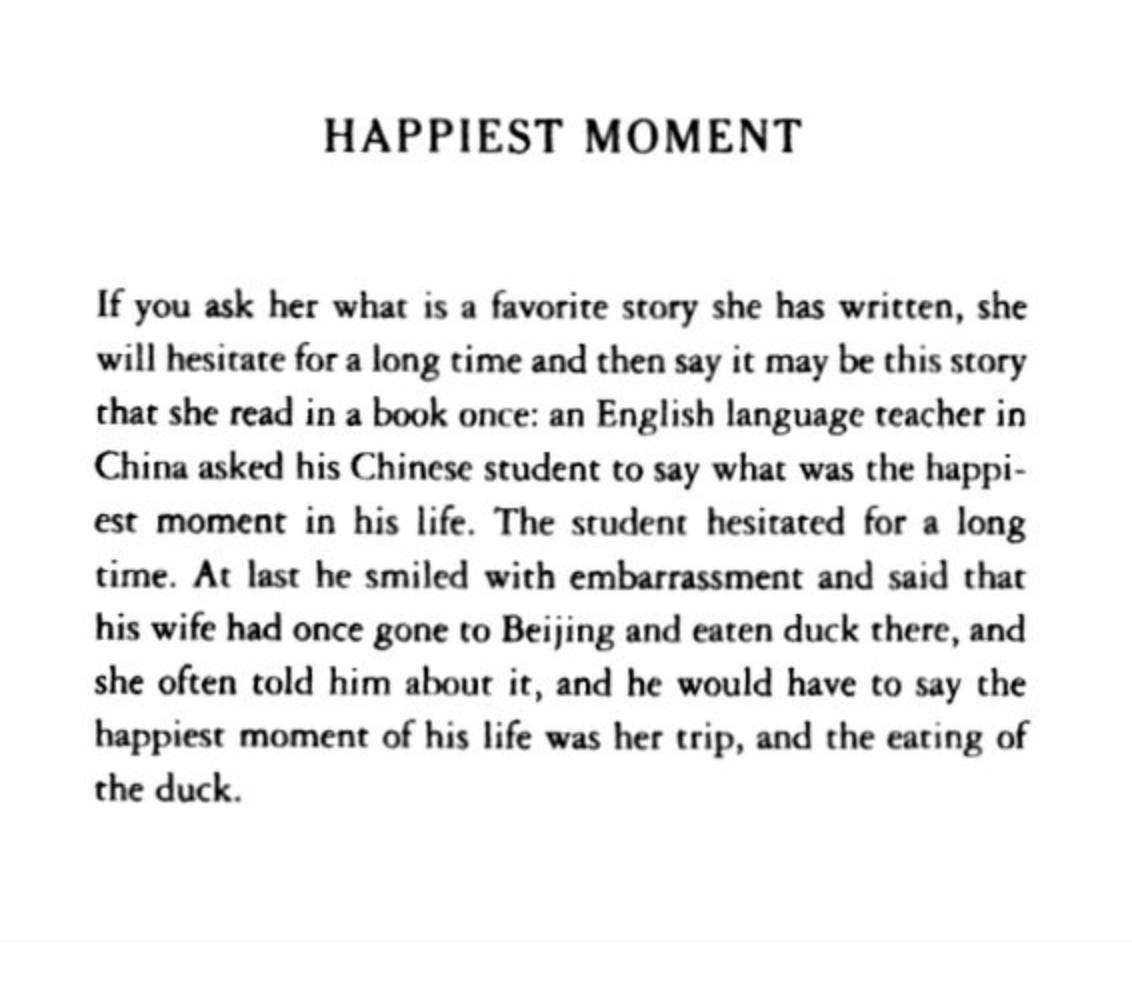What Was Your Happiest Day?
Report from a school visit in Delhi
Let’s call the student R. The principal of the school I was visiting said to others in the room soon after I arrived in her office, “Where is R.? Oh, he has a story to tell you.”
A smiling, bespectacled teenager entered the room. He told me his name and then began with a bold declaration: “I exist because of you.”
Turned out his father is Indian and Hindu; and his mother is a Pakistani Muslim. When she was being courted, R.’s mother read my book Husband of a Fanatic. She felt convinced after reading the book that it could be done and that perhaps it was a good thing—she could, in other words, marry the man who would later become R.’s father.
It was a good story. To make it even better, R.’s mother came to hear me at the school that day. This happened last week in Delhi, on the last day of my India trip. A visit had been arranged for me to visit the school to speak to students and sign books.
It was immediately clear to me when I entered the school gates that this was the sort of place where I’d not easily get admission. I hadn’t been a great student when I was in school in Patna. The kids who greeted me were bright and thoughtful. I had come prepared to like them because they had earlier sent me questions they had devised for me, questions about my work and about writing in general. Here were the students I would have wanted to be like when I was their age.
Can I say something else? During my childhood in Patna, I had never met a writer; it would have been thrilling for me to have seen an author. I also hadn’t, for that matter, met a film-maker, a painter, a journalist, an actor, or an architect. During my visit to school in Delhi, the thought did cross my mind: maybe there is a future writer here and they will learn something from what I tell them.
My first meeting was with classes 9 and 11. At first I answered questions from the prefects of the school’s Library Council. (Library Council! What a lovely idea. Another thing I didn’t have at school.) Then I talked for a bit about newly published The Green Book and why it had been an important part of my practice as a writer to keep a journal. If you keep a journal you can give a shape to the passing days—this is exactly what I had lacked in my youth. That was my message to rows upon rows of kids in front of me, about a hundred and fifty of them, maybe more.
Did they each have access to a piece of paper and a pen? I told the assembled students to write down their answer, even just a couple of lines, to the following question: in five years, what did they want to be doing?
After I left the school later that day, I looked at what I had gathered. I had no previous idea about what the students would write. I’m curious about the young and maybe a part of me wanted to know how these students would be different from the ones with whom I had grown up. You could say I wanted to get a sense of a new India.
Several students had written that they wanted to be millionaires, a few wanted to be billionaires, and at least one had used the word trillionaire. One student had done a rather elegant drawing of what he had labeled a “money pool”—it looked exactly like a swimming pool, with a diving board, but it was filled with currency notes. There were a handful of mentions of the desire to own Ferraris and Bugattis. One had written that she wanted “to be incredibly rich without having exploited people for money.” Yet another aspired to become “a high-risk investor or gambler.” Many had indicated a desire to be studying abroad in five years; Harvard and Stanford were the two institutions mentioned the most; for some reason, the plan to study abroad was often paired with a desire to also own a home in a foreign land: Sweden, Italy, South of France. At least a dozen or so wanted to become doctors; a smaller number than that wanted to be architects. A still smaller number, maybe six, had expressed the ambition to do something artistic or creative, including one who wanted to excel at tabla and another who said she wanted to top the Spotify charts. More than that number had mentioned success in cricket as a goal. In contrast to the extravagant claims regarding the future, there were one or two quiet ones who only wanted to be happy, and there was one student who had said that he wanted to be “a good person.” There was one rather incongrous declaration from a student who had written that he wanted to “definitely destroy the Pakistani army.” Another said that in five years he wanted to “be better than you who is reading this.” A handful were more introspective and said things like they hoped to find “a sense of purpose” while one individual, who reminded me of myself at that age, had written “I have zero idea where I will be after 5 years.”
It would be right to say that the serious-minded library prefects who asked me questions about my writing were as representative of the new India as all those others who had boldly stated their amibition to become millionaires and billionaires. Also, I felt this was a real change from the time I had been in school myself, the sheer number of people wanting to get rich and being confident about achieving that goal. It is true, too, that I was visiting an affluent, well-equipped school and the responses reflected a particular ethos. But I think the students were on to something, they were tapped into the zeitgeist of India’s ruling class. What about the vast majority in the country who are struggling to survive? The school’s principal had told me that following a government directive twenty-five percent of the student-body belongs to economically weaker sections and the school also caters to kids with special needs. As I know from my experience at my own college, diversity is good. It was difficult for me to know with any certainty which responses I had received had been written by the students belonging to the less privileged groups but it would be so interesting to observe the trajectory of students from starkly different backgrounds.
My next hour was with students from classes 7 and 8. These were younger kids, obviously, and also a bit more restless. I talked to them about storytelling, channeling my inner Ira Glass. Then I assigned them a simple task: the students were to get into pairs and ask their partner where they were born and then ask what was their happiest day.
I was thinking then not so much about the short-short-story by Lydia Davis called “Happiest Moment” but, instead, V.S.Naipaul’s question to an Ayatollah: Where were you born? What made you decide to take up religious studies? What did your father do? Where did you study? Where did you first preach? How did you become an ayatollah? What was your happiest day?
Once again, I collected the slips of paper from the students. So many students had written that their happiest day was the one on which they were born; more convincing were the replies where the student had mentioned their last birthday as being their happiest day. A huge number had chosen the day when they got a dog. Another winner was the day a younger sibling had been born. A few declared that this would have to be the day they first joined this school. This workshop, if we could call it that, had involved friends seated next to each other doing the interviews; it was inevitable, therefore, that over and over again the happiest day in a student’s life was the one on which they met their friend who was interviewing them. These statements, more than the ones that linked happiness to success in an exam or a competition, often hit a delightful note. The students appear playful and excited in their responses; reading them I felt uplifted because these particular answers, unlike the grand aspirations about the future spelled out by their older counterparts, stressed social relationships. The students were saying to each other, in a sense, that their well-being was linked to the other. “I exist because of you.” I hadn’t been able to say this as a part of my workshop because this lesson was not a part of my brief as writing teacher, but I knew that friendship, the ideas of love and social bonds, would play a big role in securing the future happiness of these students. In fact, not just the future but the present too. But perhaps I didn’t need to do any of that because this understanding was present in what the students themselves had written.
Here, as a token of my love for the students I met, is the story by Lydia Davis that I had mentioned above:






It is such a pleasure to experience your joy in these students and I love it that the part of you that is open to and feels that joy is something you write about (along, of course, with many things that are not at all sources of joy). I am sure you communicate your own openness to the students, and that might be just the happiest thing of all.
Oh emulating the template started WAY before the book came out. It was 1999 when "Safdar" met Mona and a young woman reading about it told herself let me watch how this turns out and by the time the book turned a year old she was convinced. Thank you for the gift of your words. Both the boy and I have something to write about when we are next quizzed about our "happiest day" .